Related Research Articles

Malaysia is a modern concept, created in the second half of the 20th century. However, contemporary Malaysia regards the entire history of Malaya and Borneo, spanning thousands of years back to prehistoric times, as its own history.

The Mau Mau rebellion (1952–1960), also known as the Mau Mau uprising, Mau Mau revolt or Kenya Emergency, was a war in the British Kenya Colony (1920–1963) between the Kenya Land and Freedom Army (KLFA), also known as the Mau Mau, and the British authorities.

The Malayan Emergency, also known as the Anti–British National Liberation War(1948–1960), was a guerrilla war fought in British Malaya between communist pro-independence fighters of the Malayan National Liberation Army (MNLA) and the military forces of the Federation of Malaya, British Empire and Commonwealth. The communists fought to win independence for Malaya from the British Empire and to establish a socialist economy, while the Malayan Federation and Commonwealth forces fought to combat communism and protect British economic and colonial interests. The term "Emergency" was used by the British to characterise the conflict in order to avoid referring to it as a war, because London-based insurers would not pay out in instances of civil wars.

Field Marshal Sir John Lyon Chapple, was a British Army officer who served as Chief of the General Staff (CGS), the professional head of the British Army, from 1988 to 1992. Early in his military career he saw action during the Malayan Emergency and again during the Indonesia–Malaysia confrontation and later in his career he provided advice to the British government during the Gulf War.
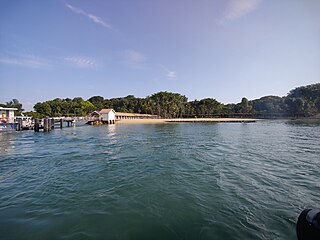
Saint John's Island also known as St John's is an island in the Straits of Singapore located 6.5 km off the southern coast of Singapore. With an area of 0.41 km2 (0.16 sq mi), it is the largest of the Marine Park islands which also include the Sisters' Islands and Pulau Tekukor. St John's was colonised by the British along with mainland Singapore in the 19th century and was the site of a colonial quarantine centre. In the 20th century, the island served as a detention centre, drug rehabilitation centre and refugee settlement. Singapore gained independence under the Government of Singapore in the mid-20th century and maintained sovereignty over St John's. In the present day, the island has doubled as grounds for recreational facilities and aquaculture research and development facilities.

The Malayan Communist Party (MCP), officially the Communist Party of Malaya (CPM), was a Marxist–Leninist and anti-imperialist communist party which was active in British Malaya and later, the modern states of Malaysia and Singapore from 1930 to 1989. It was responsible for the creation of both the Malayan Peoples' Anti-Japanese Army and the Malayan National Liberation Army.
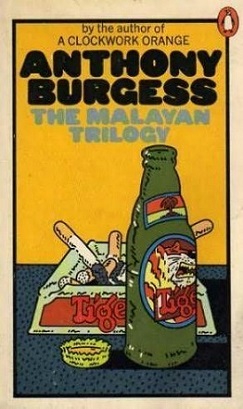
The Malayan Trilogy, also published as The Long Day Wanes: A Malayan Trilogy in the United States, is a comic 'triptych' of novels by Anthony Burgess set amidst the decolonisation of Malaya.

The Briggs Plan was a military plan devised by British General Sir Harold Briggs shortly after his appointment in 1950 as Director of Operations during the Malayan Emergency (1948–1960). The plan aimed to defeat the Malayan National Liberation Army by cutting them off from their sources of support amongst the rural population. To achieve this a large programme of forced resettlement of Malayan peasantry was undertaken, under which about 500,000 people were forcibly transferred from their land and moved to concentration camps euphemistically referred to as "new villages".

The Malayan National Liberation Army (MNLA), often mistranslated as the Malayan Races Liberation Army, was a communist guerrilla army that fought for Malayan independence from the British Empire during the Malayan Emergency (1948–1960) and later fought against the Malaysian government in the Communist insurgency in Malaysia (1968–1989). Their leader was a trade union activist known as Chin Peng who had previously been awarded an OBE by the British for waging a guerrilla war against the Japanese occupation of Malaya. Many MNLA fighters were former members of the Malayan Peoples' Anti-Japanese Army (MPAJA) which had been previously trained and funded by the British to fight against Japan during the Second World War.
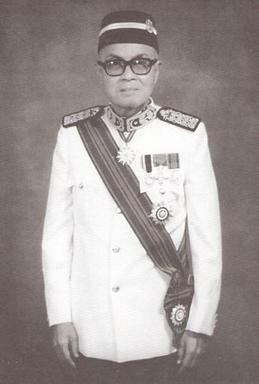
Too Chee Chew (杜志超 M.B.E., better known as C. C. Too, was a major exponent of psychological warfare in Malaysia.

The Cyprus Emergency, also known as the Greek Cypriot War of Independence or the Cypriot War of Independence, was a conflict fought in British Cyprus between November 1955 and March 1959.

Lim Peng Siang was a businessperson in Singapore and Malaya. Together with his brother Lim Peng Mau, he founded the Ho Hong Group of companies in 1904, which had interests in banking, shipping, parboiled rice, oil mills, cement, coconut and other businesses. He was a President of the Singapore Chinese Chamber of Commerce and a member of the Chinese Advisory Board. Peng Siang Quay in Singapore is named after him.
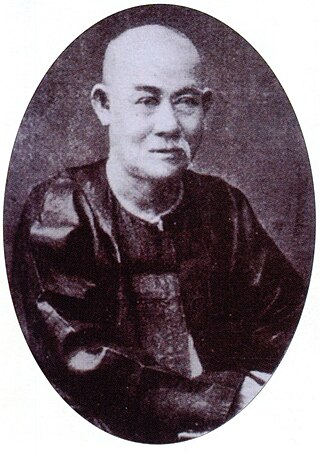
Foo Tye Sin was a Justice of the Peace and an influential community leader of 19th century. Penang born Foo Tye Sin, a British subject, was a Hakka tin miner who could trace his ancestry to the Yong Ting District, Ting Chou Prefecture, Fujian. He was educated at St. Xavier's Institution and the Penang Free School. Tye Sin Street (四条路), or Lebuh Tye Sin as it is now known as, is named after him.
Eu Chooi Yip was a prominent member of the anti-colonial and Communist movements in Malaya and Singapore in the 1950s and 1960s. Eu Chooi Yip was born in Kuantan, Malaysia.
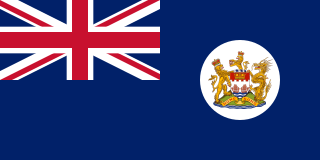
Hong Kong was a colony of the British Empire and later a dependent territory of the United Kingdom from 1841 to 1997, apart from a period of Japanese occupation from 1941 to 1945 during the Pacific War. The colonial period began with the British occupation of Hong Kong Island in 1841, during the First Opium War between the British and the Qing dynasty. The Qing had wanted to enforce its prohibition of opium importation within the dynasty that was being exported mostly from British India and was causing widespread addiction among the populace.
Australian involvement in the Malayan Emergency lasted 13 years, between 1950 and 1963, with army, air force and naval units serving. The Malayan Emergency was a guerrilla war fought between Commonwealth armed forces and the Malayan National Liberation Army (MNLA), the military arm of the Malayan Communist Party, from 1948 to 1960 in Malaya. The Malayan Emergency was the longest continuous military commitment in Australia's history. Thirty-nine Australians were killed and 27 wounded.

Winning hearts and minds is a concept occasionally expressed in the resolution of war, insurgency, and other conflicts, in which one side seeks to prevail not by the use of superior force, but by making emotional or intellectual appeals to sway supporters of the other side.
The Ruck Family massacre took place during the Mau Mau Uprising. Farmer Roger Ruck, his wife Esme and six-year-old son Michael, along with one of their African servants, were killed by Mau Mau, one of whom allegedly worked for the family. The killing shocked the European community in Kenya and was widely reported in the Kenyan and British press, with many including graphic photographs of the dead child. The incident was significant in radicalising the settler population. Within 48 hours of the killings, 1,500 European settlers marched on Government House, demanding action from then Governor of Kenya Evelyn Baring.

Sir Han Hoe Lim was a Singaporean physician and politician.
Anarchism in Malaysia arose from the revolutionary activities of Chinese immigrants in British Malaya, who were the first to construct an organized anarchist movement in the country - reaching its peak during the 1920s. After a campaign of repression by the British authorities, anarchism was supplanted by Bolshevism as the leading revolutionary current, until the resurgence of the anarchist movement during the 1980s, as part of the Malaysian punk scene.
References
- ↑ Linstrum, Erik (2023). Age of Emergency: Living with Violence at the End of the British Empire. New York: Oxford University Press. p. 36. ISBN 978-0-19-757203-0.
- ↑ Hack, Karl (2022). The Malayan Emergency: Revolution and Counterinsurgency at the End of Empire. Cambridge: Cambridge University Press. p. 409.
- ↑ Bennett, Huw; Romijn, Peter (2022). Luttikhuis, Bart; Brocades Zaalberg, Thijs (eds.). Empire's Violent End: Comparing Dutch, British, and French Wars of Decolonization, 1945–1962. Cornell University Press. p. 30. ISBN 978-1501764141.
- ↑ "Political developments: Lim Hong Bee, editor of the Malayan Monitor". discovery.nationalarchives.gov.uk. Retrieved 1 August 2023.